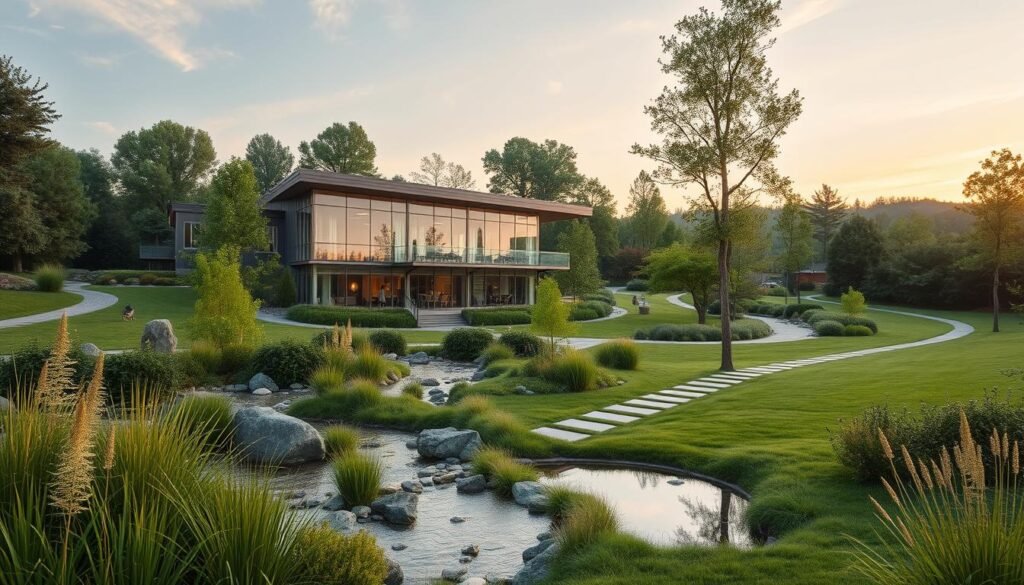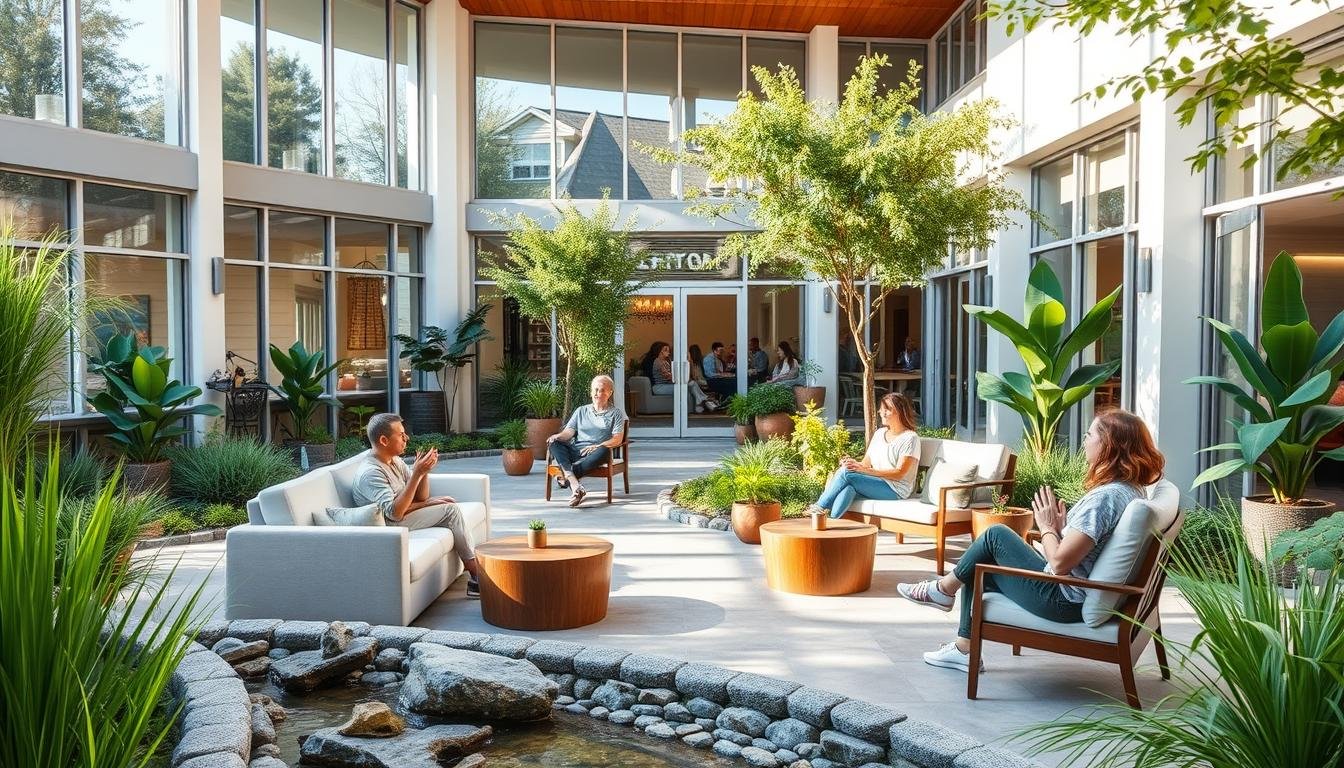Do you struggle to find help for addiction? Or do you think you can handle it alone? Many people face this dilemma. But, seeking help at a good addiction-rehab-center is a big step towards recovery.
Recovery is more than just stopping a substance. It’s about finding the right help for you. There are many options for addiction recovery support.
It’s important to find the best rehab centers near you. Places like the Ohio Recovery Center offer medical detox. And, The Recovery Village Columbus shows quality care with a 4.5-star rating.
Whether you need a residential program or outpatient care, knowing your options helps. It lets you take a step towards recovery.
Choosing a well-reviewed addiction-rehab-center is a big step. It’s not just for you, but for your loved ones too. Are you ready to start your journey in addiction recovery?
Key Takeaways
- Finding the right addiction-rehab-center is essential for effective recovery.
- Different treatment options, such as inpatient and outpatient services, cater to varying needs.
- High patient ratings, like the 4.8-star rating of Findlay Recovery Center, signify quality care.
- Programs with personalized care can significantly improve mental health conditions related to addiction.
- Utilizing multiple treatment approaches can enhance the likelihood of successful recovery.
Understanding Addiction and Its Impact
Addiction is a complex disease that affects the brain and behavior. It changes how our brain works and how we behave. This change can last a long time.
Chronic drug use changes the brain, mainly the part that helps us make decisions. This part is called the prefrontal cortex.
The impact of addiction is not just on the person. It affects families and communities too. It leads to poor choices and impulsive actions.
The brain’s reward system gets hijacked. This makes people crave drugs intensely. It’s hard to resist these cravings.
Genetics, environment, and personal choices play a role in addiction. This shows how complex it is.
Addiction makes the brain release more dopamine. This can lead to needing more drugs to feel good. It also affects memory and emotional control.
Recognizing addiction early is key to treating it. There are signs to look out for. These include ignoring commitments and changes in sleep patterns.
Substance abuse has serious statistics. Knowing this helps us find better ways to treat it. Resources like addictionhotlinetoday.com and habitrecovery.com offer more information.
| Factor | Impact on Addiction |
|---|---|
| Genetics | Accounts for 40-60% likelihood of developing Substance Use Disorder |
| Environmental Influences | Ties to drug exposure, trauma, and stress contribute to addiction risk |
| Mental Health Disorders | Higher prevalence of Substance Use Disorders among individuals with these issues |
| Brain Changes | Alterations in brain chemistry lead to compulsive behaviors and cravings |
Signs You May Need Addiction Treatment
It’s important to know if you might have an addiction. Spotting the signs early can help you get the right help. The DSM-5 lists 11 signs for diagnosing addiction. If you have three or more, it’s a moderate disorder. Six or more means it’s severe.
- Intense cravings for substances
- Neglecting work, school, or home responsibilities
- Health problems like weight loss, insomnia, and memory issues
- Endangering oneself or others due to substance use
- Financial instability, leading to a lack of funds for essentials
- Frequent conflicts with friends or family regarding substance use
Think about these signs. If you choose substances over important tasks, it’s a big problem. If loved ones worry about your habits, it’s a clear sign you need help.
Getting medical detox is often the first step. Then, you can find the right addiction treatment. There are many programs to fit your needs. Spotting addiction signs is the first step to taking back your life.
What to Expect at an Addiction-Rehab-Center
Going to an addiction-rehab-center can feel scary. Knowing about the different treatments helps. Most places offer a safe space for healing and recovery. I’ll talk about the kinds of treatments and what detox programs do.
Types of Addiction Treatment Programs
Rehab programs vary to fit each person’s needs. They include:
- Inpatient Rehabilitation: Good for those with serious or long-term addiction. It’s a full-time program, lasting 30 days or more.
- Outpatient Rehabilitation: You can keep your daily life while going to treatment. Intensive outpatient programs (IOPs) are about three hours a day, three days a week.
- Aftercare Programs: These help after you finish your first treatment. They focus on staying sober and finding community help.
Detox Programs Explained
Detox programs are key for starting recovery. They help manage withdrawal symptoms, which can be tough. You’ll get a medical check-up right away, taking about 60-90 minutes.
These programs offer both medical and mental support during detox. They prepare you for more treatments like cognitive-behavioral therapy and motivational interviewing.
Knowing what to expect at a rehab center can make you feel less scared. Learning about the structure and services helps. With over 16,000 addiction treatment centers in the U.S., finding the right one is important for your recovery.
Finding the Best Rehab Centers Near You
Finding the right place for addiction treatment can be hard. But, there are many resources to help. The Substance Abuse and Mental Health Services Administration (SAMHSA) is a great tool. It has a list of rehab centers near you that are approved by the state.
When looking at rehab centers, ask important questions. Find out what treatments they offer. This is key if you need special help like detox or treatment for both addiction and mental health.
In California, many rehab centers have payment plans. Over 60% of them adjust costs based on what you can pay. More than half accept private insurance. And over 80% take cash or self-payment. Plus, over 30% accept Medicaid, making treatment more affordable.
Here’s a quick overview of some factors to consider when searching for rehab centers:
| Factor | Details |
|---|---|
| Accreditation | Ensure the facility is accredited by organizations like CARF and JCAHO. |
| Payment Options | Look for facilities that offer sliding scale payment, accept insurance, or provide financing solutions. |
| Types of Treatment | Understand the levels of care available: detox, inpatient treatment, outpatient programs, and IOPs. |
| Environmental Factors | Select a center that provides a calm, supportive environment to aid recovery. |
| Aftercare Support | Check for aftercare services like individual therapy or continued group therapy programs. |
Finding the best rehab centers is a big step towards recovery. With the right help, I can start healing and rebuilding my life. It’s a tough journey, but knowing I have good treatment options gives me hope.

Exploring Various Addiction Treatment Options
It’s key to know the differences in addiction treatment. Each program has its own benefits. They help people find their way to recovery.
Inpatient Rehab Centers
Inpatient rehab centers offer a structured place for those with long-term addiction. They provide 24/7 care. This lets patients focus on getting better without daily life’s distractions.
They offer:
- Medically supervised detox to manage withdrawal symptoms safely
- Individual therapy sessions tailored to address personal challenges
- Group therapy for shared experiences and support
- Holistic therapies like yoga and meditation for overall well-being
This approach helps with addiction’s physical, mental, and emotional sides. It supports a successful recovery.
Outpatient Addiction Services
Outpatient services are flexible for those with work or family duties. Clients can go to sessions at set times. This makes it easier to fit treatment into their lives.
- Access to intensive outpatient programs (IOP) for a focused treatment experience
- General outpatient rehab options that cater to mild substance use disorders
- Support through group and individual counseling sessions
- Utilization of therapy options such as Cognitive Behavioral Therapy (CBT) and Dialectical Behavior Therapy (DBT)
Inpatient and outpatient services are both important for recovery. Knowing about these options helps people choose the right one. It depends on their situation and addiction’s severity.
Holistic Approaches in Substance Abuse Counseling
In my journey through recovery, I found that holistic addiction treatment really helped. It focuses on healing the whole person, not just the addiction. It includes emotional, physical, and spiritual parts, helping to balance life.
About 4 out of 10 adults in the U.S. use alternative medicine in recovery. These methods help with withdrawal, stress, and nutrition problems from addiction. Mixing traditional medicine with holistic practices makes recovery better.
Some popular holistic therapies I tried included:
- Nutritional therapy for better eating habits
- Exercise and recreational therapy to stimulate physical health
- Mindfulness meditation for stress relief and mental clarity
- Massage therapy for relaxation and emotional healing
- Acupuncture for physical and emotional balance
Places like American Addiction Centers offer a mix of treatments. They include yoga, breath work, art, and music therapy. These activities help with emotional healing.
By focusing on physical, emotional, social, spiritual, and intellectual care, holistic treatment helps a lot. It leads to better recovery, more satisfaction, and higher success rates in treating addiction.
| Holistic Therapy Elements | Description |
|---|---|
| Physical | Focuses on fitness, nutrition, sleep, and healthy behaviors. |
| Emotional | Aims to enhance balance, coping abilities, and processing feelings. |
| Social | Builds relationships and sober networks. |
| Spiritual | Encourages purpose, appreciation, and self-connection. |
| Intellectual | Focuses on establishing boundaries, developing plans, and building skills. |
Faith-Based Rehabilitation Programs
Faith-based rehab mixes spiritual ideas with proven methods. It helps people find their faith while fighting addiction. The Banyan Treatment Center is a big name here. It welcomes Atheists, Agnostics, and Jews too.
Banyan Treatment Center offers many ways to get help. You can choose from partial hospitalization, intensive outpatient, or groups for detox and treatment. This way, everyone finds the right support.
The program at Banyan uses faith and emotional support. It helps people change and heal. People say it changed their lives, helping them find their spiritual path again.
Many people find this approach helpful. In 2015, 76.5% of Americans said they were religious. This spiritual bond is key for the 22.7 million Americans fighting addiction.
The Substance Abuse and Mental Health Services Administration backs over 800 faith-based programs. This means these programs get the money they need to help people beat addiction. Being in a faith-based rehab program helps you overcome addiction. It also builds a community that supports spiritual growth and recovery.
Affordable Free Drug and Alcohol Rehab Centers
Dealing with addiction is tough, and money can make it even harder. Many people in our area face poverty, job loss, or homelessness. But, there are free and affordable ways to get help.

State-funded rehab services help those without insurance or money. Most states have programs for special groups, like pregnant women or those with severe addiction. To get help, you must live there, show you need it, and have an addiction.
Also, faith groups offer free treatment with spiritual support. This helps people feel supported in their recovery journey.
In Missouri, places like Beacon Mental Health and Gateway Foundation help. They offer detox, treatment plans, and counseling. They take Medicaid and help with costs through sliding fees or scholarships.
| Facility Name | Type of Treatment | Payment Options |
|---|---|---|
| Beacon Mental Health | Inpatient and Outpatient | Sliding Scale, Medicaid |
| Gateway Foundation | Residential | Grants, Private Insurance |
| Gibson Recovery Center | Detox and Counseling | Medicaid, Government Funding |
| Queen of Peace Center | Women’s Services | Sliding Scale, Medicaid |
Choosing a low-cost rehab has good and bad sides. The big plus is getting help that really works. But, waiting long and not getting all therapies can be hard. Yet, these options mean everyone can try to get better, no matter their money situation.
Looking into local help can make a big difference. It lets people get the support they need without worrying about money.
Importance of Aftercare and Support Groups
After treatment, the journey to stay sober is just starting. Your mind, friends, and feelings are key to staying clean. Sadly, 40% to 60% of people who try to quit drugs or alcohol might slip up again.
Aftercare services are vital for ongoing healing. They offer many types of help, like:
- Outpatient counseling or therapy, which can vary in intensity and frequency, from daily sessions to a few times per week.
- Partial hospitalization programs (PHPs) that require individuals to attend therapy for 6 to 8 hours each day following inpatient treatment.
- Intensive outpatient programs (IOPs), consisting of at least 9 hours of treatment per week, often in 3-hour blocks.
- Standard outpatient programs focusing on behavioral changes with less than 9 hours of treatment weekly.
Support groups are a big help. Places like Alcoholics Anonymous and SMART Recovery let people share and learn from each other. Being part of these groups can really help you stay on track.
Being part of alumni programs from treatment centers also helps. These programs suggest living in sober places. Many meetings are free and help both individuals and their families.
Getting a sponsor from a 12-Step program is also helpful. They offer advice based on their own experiences. Aftercare plans usually last at least a year, but can change as needed.
Preventing relapse involves therapy, environment, association, and medication—the T.E.A.M. approach. This plan stresses the need for a strong support network and ongoing therapy. Being open and honest is key to avoiding relapse.
Staying in an aftercare program for the full time really boosts your chances of staying sober. Recovery is a journey that needs commitment, a supportive community, and using the tools learned in treatment.
How to Choose the Right Rehab Facility for You
Choosing the right rehab facility can feel overwhelming. There are many options. It’s important to think about what you need and what you want to achieve.
First, I look at the treatment options. Some need residential care for serious issues. Others might do well with outpatient care for less severe problems. Knowing this helps me choose the right level of care.
Then, I check the credentials of the staff. I want staff that is well-trained and uses proven treatments. Good staff can really help you get better.
Accreditations also matter. Places with CARF or The Joint Commission approval are known for quality. This makes me feel more confident in my choice.
- Personal treatment goals: I think about what I want to get out of treatment. Do I want to stop using drugs, learn new ways to handle stress, or deal with mental health issues?
- Financial considerations: Treatment costs vary. I look for places that offer help with costs.
- Location: Being close or far from the facility can affect my recovery. Some like being close, others prefer being away from triggers.
Lastly, I check if they offer aftercare services. These services are key for staying sober after treatment. Having support makes a big difference in my recovery.
| Factor | Considerations |
|---|---|
| Treatment Options | Residential vs. Outpatient programs |
| Staff Credentials | Expertise in evidence-based therapies |
| Accreditations | CARF, The Joint Commission, etc. |
| Personal Goals | Specific outcomes desired from treatment |
| Financial Assistance | Insurance coverage, payment plans available |
| Location | Nearby convenience vs. removal from triggers |
| Aftercare Services | Continued support and counseling options |
By considering these factors, I can find a rehab facility that supports my recovery journey.
Conclusion
Starting my journey to overcome addiction is a big step. I’ve learned how important it is to get help from a good place like the Conclusions Treatment Center in Mission Hills, CA. They offer many treatments and help after you’re done.
Looking back, seeing the signs of addiction was key. The right program can really help. It should fit my needs, helping with my mind and addiction. With help from therapy and family, I’m on the right path.
My journey shows that recovery is personal but not alone. I’ve learned from nutrition, fitness, and life skills. Success in rehab means staying sober and having ongoing support. I’m ready to keep moving forward with the help of those around me.
